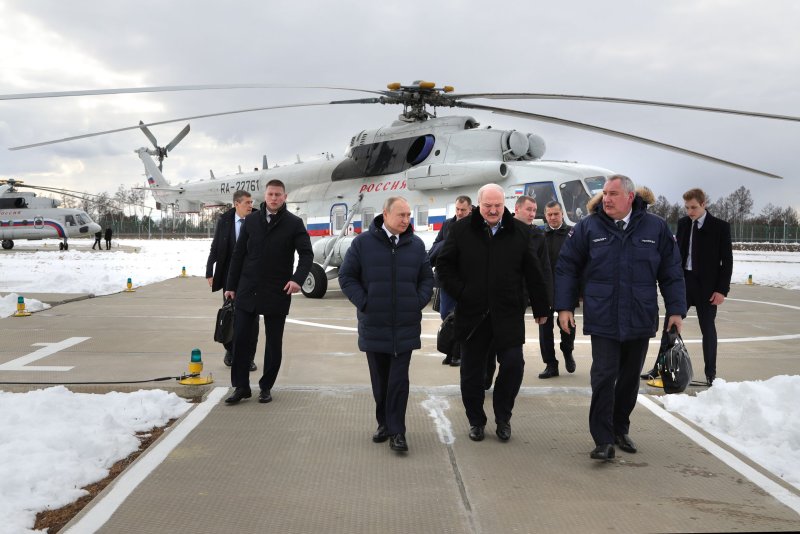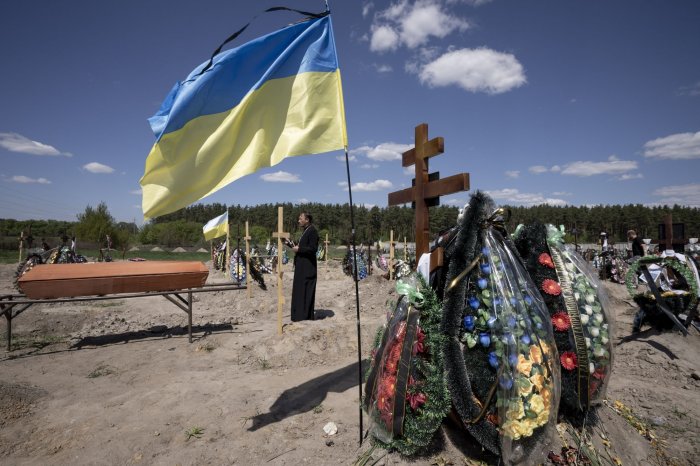Russian President Vladimir Putin (front L) and Belarusian President Alexander Lukashenko (front C) visit the Vostochny Cosmodrome outside Tsiolkovsky, Russia, on Tuesday. Putin said during the visit that the main goal of his military campaign in Ukraine is to "help people." Photo by Mikhail Klimentyev/Kremlin Pool/Sputnik/EPA-EFE
April 12 (UPI) -- Russian President Vladimir Putin on Tuesday said peace negotiations with Ukraine reached a "dead end," accusing Kyiv of violating previous agreements.
He made the comments during a joint news conference at the Vostochny Cosmodrome with Belarusian President Alexander Lukaschenko. The two allies met at the spaceport to talk with rocket and space industry representatives, state-run Tass news agency reported.
Putin accused Ukraine of breaking agreements the two countries made during talks in Istanbul in March, though he declined to offer details of these allegations.
During those peace talks, Russia agreed to reduce military activity around Kyiv and the northern city of Chernihiv. Ahead of the talks, Ukrainian President Volodymyr Zelensky said he was open to declaring neutrality and a possible compromise over the disputed separatist-held regions in far eastern Ukraine known as the Donbas.
During Tuesday's remarks, Putin said the war with Ukraine was inevitable.
"There was simply no choice, it was only a matter of time when it will begin. That's it."
Putin acknowledged and justified the offensive in eastern Ukraine by saying that Russian forces must protect separatists there. Putin has falsely been saying since the war began that his military is on a "peacekeeping" mission.
"What we are doing is helping people and saving people, on the one hand, and on the other hand, we are simply taking measures to ensure the security of Russia itself," Putin said, according to The New York Times.
Putin said that the "main goal" of the war is to "help people" in Ukraine's Donbas region.
Meanwhile, Ukrainian officials said Tuesday that they're investigating unconfirmed reports that the Russian military has used "phosphorus munitions" in the key southern port city of Mariupol, which would be the first time chemical weapons have been used in the seven-week war.
Chemical weapons were used in Syria's ongoing civil war, where Russia assisted the government's army against opposition forces and civilians. Ukrainian officials said they're concerned that Russian President Vladimir Putin's forces are resorting to the same in Ukraine.
Russian troops have been attacking Mariupol for weeks due to its strategic location and tactical importance related to the rest of the battle-scarred nation. Moscow began the fighting on Feb. 24.
"There is a theory that these could be phosphorus munitions," Ukrainian Deputy Defense Minister Hanna Malyar said according to The Guardian. "Official information will come later."
Malyar told Ukrainian television that phosphorus munitions have "possibly" been used in Mariupol.
British officials have previously cautioned that Moscow could use the phosphorus bombs, which are intended to severely burn their victims. Phosphorus munitions are banned by international law from being used in civilian areas.
Pro-Russian separatists in the breakaway region of Donetsk denied that chemical weapons had been used in Mariupol and the British military has not confirmed their use in south Ukraine.
Mariupol's mayor, Vadym Boichenko, meanwhile, announced Tuesday that the number of deaths in his city could surpass 20,000.
"We know there is evidence that bodies disappear from the streets," he said in televised remarks. "We know that there are so-called 'concentration places' where they hide bodies and they then plan to destroy the evidence of tortures they committed in the city of Mariupol. We call it 'genocide,' we call it 'war crime.'"
More military vehicles were gathering in Russia's Rostov region and moving toward Ukraine's Donbas, where Ukrainian officials said Monday that Moscow is planning for a new offensive campaign. The Donbas comprises Donetsk and Luhansk, two separatist-held areas that have been fighting the Ukrainian government for almost a decade. Putin declared both areas independent in February just days before the invasion.
"From my point of view, this big offensive [in the East] has already started," said Vadym Denysenko, an adviser to Ukraine's internal affairs minister, according to CNN.
"We have to understand it's not going to be their petition of Feb 24th, when the first airstrikes and explosions started, and we said: 'The war has begun.' The big offensive de facto has already started."
Attempts to clear civilians from war zones have failed in many cases because of continued fighting after humanitarian corridors had been negotiated. The United Nations High Commissioner for Human Rights said last weekend that 1,800 civilians have been killed and 2,500 have been injured since the start of the war.
Priest Andrii Gavalin presides over the funeral of Eugene Bogdanov, 35, in Bucha, Ukraine, on May 10. Bogdanov went missing two months ago. His wife, Natalia Bogdanova, was searching for him throughout the Kyiv and Bucha regions when his body was found at a morgue in Belaya Tserkov on May 9. Photo by Ken Cedeno/UPI |
License Photo
















